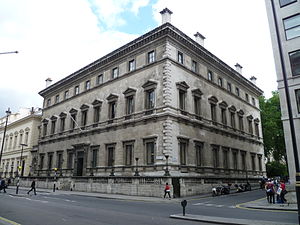Reform Club
| Reform Club | |
|---|---|

Reform Club viewed from Pall Mall, adjacent to the Travellers Club
|
|
| General information | |
| Architectural style | Italian Renaissance |
| Address |
Pall Mall London, SW1 |
| Coordinates | 51°30′24″N 0°08′01″W / 51.506785°N 0.133625°W |
| Groundbreaking | 1837 |
| Completed | 1841 |
| Landlord | Crown Estate Commissioners |
| Design and construction | |
| Architect | Sir Charles Barry |
| Civil engineer | Thomas Grissell & Morton Peto |
| Main contractor | Grissell & Peto |
| Website | |
| www |
|
The Reform Club is a private members club on the south side of Pall Mall in central London. As with all gentlemen’s clubs, it originally comprised an all-male membership, but was the first to change its rules to include the admission of women in 1981.
"The Reform" (as it is known in common parlance) enjoys extensive reciprocity with similar clubs around the world, and attracts significant numbers of foreign members, including diplomats.
The club was founded in 1836 by Edward Ellice, Member of Parliament (MP) for Coventry and Whig Whip, whose riches came from the Hudson's Bay Company but whose zeal was chiefly devoted to securing the passage of the Reform Act 1832. This new club, for members of both Houses of Parliament, was intended to be a forum for the radical ideas which the First Reform Bill represented: a bastion of liberal and progressive thought that became closely associated with the Liberal Party, who largely succeeded the Whigs in the second half of the 19th century.
Brooks's Club, the headquarters of the old Whig aristocracy, was neither able nor prepared to open its doors to a flood of new men, so preliminary meetings were held at Ellice's house to plan a much larger club, which would promote 'the social intercourse of the reformers of the United Kingdom'. In the 19th century, any Liberal Party MP or Peer crossing the floor, to join or work with another party, was expected to resign as a member.
...
Wikipedia
